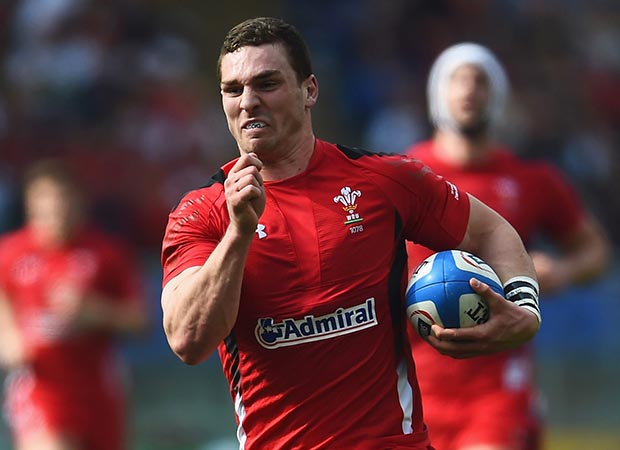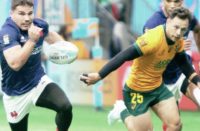 So far so good. After Rugby's ill-starred Olympic history it's been comparatively plain sailing to date for the 2016 tournament, at least on the pure rugby side with virtually all the sides the organisers would either expect or hope to be involved in Rio booking their places.
So far so good. After Rugby's ill-starred Olympic history it's been comparatively plain sailing to date for the 2016 tournament, at least on the pure rugby side with virtually all the sides the organisers would either expect or hope to be involved in Rio booking their places.
Off the field there was a fair bit of confusion and debate early on as to the competition venue but World Rugby is happy enough with the 20,000 temporary stadium at the multi-sport Deodoro complex in the North West suburbs of the city where the Modern Pentathlon, BMX, Mountain Biking and Shooting events are also being staged.
“It should be a relaxed fun venue and that's important for us and a big part of what Sevens is about,” says World Rugby chief executive Brett Gosper. “It's the fine detail we need to keep on top of now and the IOC will be getting a comprehensive report back in February.
“We need to make sure that the pitch and lights installed are up to spec but also the spectator infrastructure. The venue is a little bit out of town so the transport needs to be accessible and the amenities good. Fans might want to stay on between rugby sessions so food and drink needs to be available and a big screen to relax in front of watching the other Olympic sports.”
A decent number of big ‘names' from Test rugby have already put their hands up for the event. Quade Cooper and Henry Speight for Australia with Bernard Foley also reportedly interested; Sonny Bill Williams, Liam Messam and Ardie Savea for New Zealand and Brian Habana and Damian de Allende for South Africa. Others I suspect will follow nearer the time while we await to see which British players will accept the challenge.
George North and Danny Cipriani are consistently mentioned as candidates while of those on the fringe of Test rugby you have to say that Christian Wade fits the bill and might well be available for warm up events as well.
The organisers will be pleased with a fairly hiccough free if exhaustive qualifying process. Brazil qualify as hosts and in the men's tournament Fiji, South Africa, New Zealand and Great Britain automatically join them by virtue of filling the top four places in the World Series last season.
South Arica's automatic qualification was a particular boon to the tournament. If the Blitzbokke had failed to secure an automatic spot the likelihood is that they would have won the Africa qualifier and condemned Kenya to probable elimination.
Kenya, and particularly their Sevens programme, have endured huge off-field disruptions in recent seasons but they are still capable of fielding a very competitive team and are exactly the kind of rugby nation that Olympic rugby is targeted at. Their absence would have been a big blow.
Elsewhere, the fleet-footed USA Seven that took the London Sevens by storm last May avoided any banana skins – ie they beat a tough Canada outfit – in the North American qualifying tournament. Their presence, defending their 1924 Olympic crown, is a useful selling point for the American TV audience which is something the organisers had always hoped for.
Australia have the players and the potential to go all the way in Rio and, having just missed out on an automatic spot, made no mistake in their Oceania qualifier back in November seeing off Tonga in the final with a 50-0 drubbing.
Argentina will arrive in Brazil with a very useful squad and indeed they have already reached the final of the South African leg of the World Series this season. Japan are improving and it was important they be in Rio ahead of their own 2020 Olympics while France, like New Zealand, bring a certain cache to any rugby gathering. All that is missing so far is a fired-up big-hitting Samoan squad and that could yet happen.
The Samoans head up a cracking final qualifying tournament in Monaco in June –16 teams competing for the one place still available in Rio – but could be stretched in a strong field. Canada, Spain and Russia are proven nations who buy into the Olympics, while Zimbabwe could be dangerous floaters along with Tonga and Ireland. The last two could potentially field very strong sides depending on the availability of players.
In the women's tournament all the big hitters have made it safely through but the big story is Colombia, very much an unknown quantity, who stormed through the CONSUR (South American) qualifying tournament with seven straight wins including the one against Argentina when Guadalupe Lopez scored the winning try with ten seconds left on the clock.
The one discordant note has been the decision of the South African Sports Confederation and Olympic committee (SASCOC) not to allow their team to travel to Rio despite their winning the Africa qualifying tournament. Runners up Kenya will take their place
“The qualifying process has been very good,” says Gosper. “Each regional qualifier has been an event in itself and in total and we've had 70 nations involved. With the final repechage events in both tournaments still to come we have already assembled high quality but diverse fields.
“From a rugby point of view it was disappointing that SASCOC chose not to take up the place in Rio their women had earned, it could have been a big step in the development of the women's game in South Africa. But each Olympic Federation has its own goals and resources, and we have to respect their decision.”


























